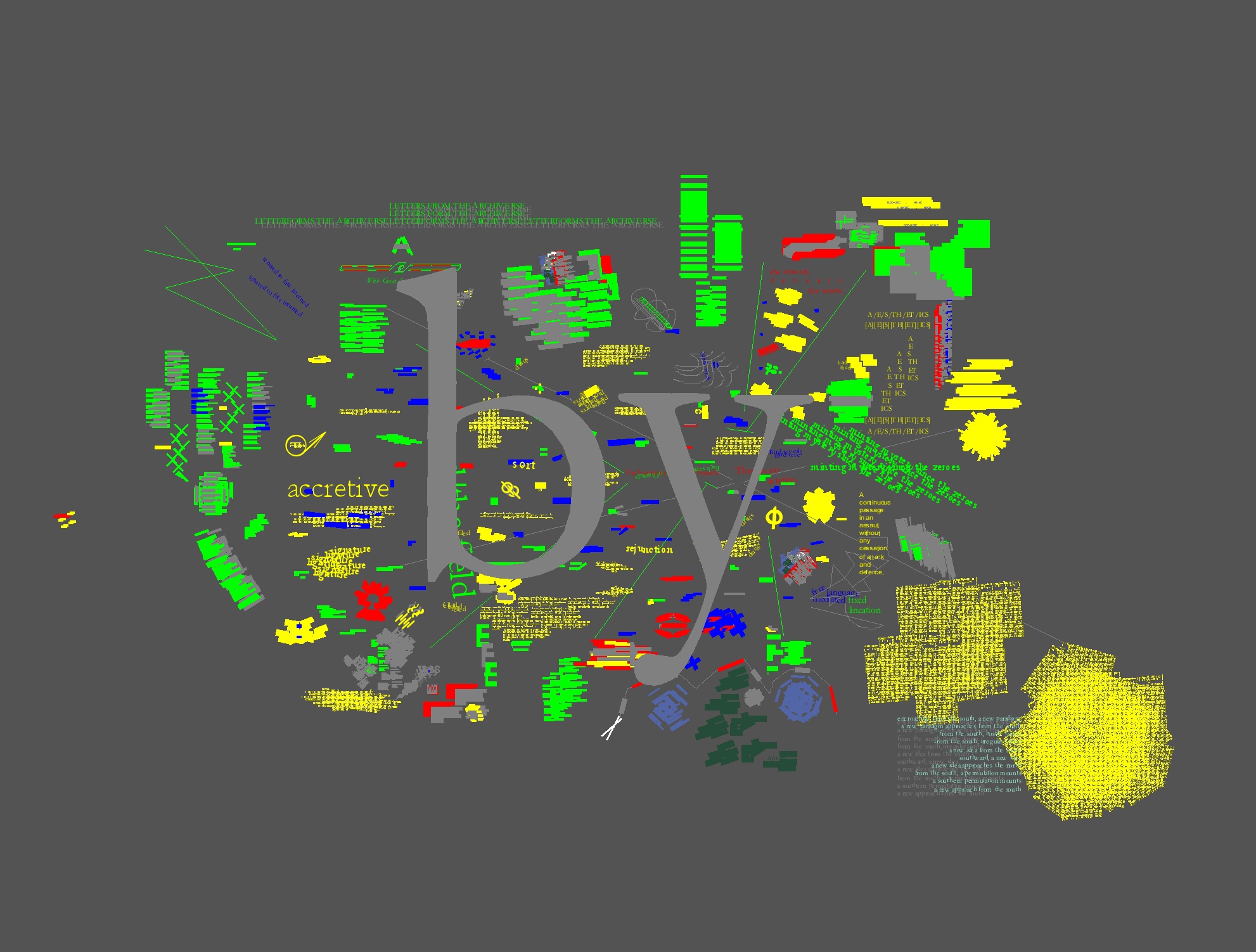ARCHIVERSE as Archive and Pseudo-Archive
May 2014 marks a seam in THE ARCHIVERSE digital residency at OPR. The archive established here will remain—but will no longer accumulate—at this site. This is an opportunity and an impasse, just as THE ARCHIVERSE is both limitless and irretrievable, diagrammatic and unincorporate.
When we speak of THE ARCHIVERSE in terms of archive, we speak to archiversal origins and operations. This shift at OPR necessarily draws the residency page further away from THE ARCHIVERSE, as it becomes (in these traces) a more conservative archive. That is, the residency archive (presumably) will not change. THE ARCHIVERSE preserves itself, but is always (explicitly) in flux. The terms that make up ARCHIVERSE—claim of origin (or original claim), arch, passageway, architecture, archive, river, hive, reverse, universe, multiverse, verse, averse, versus, serve, server, sever, etc.—are in motion, just as language objects are kinetic letterforms within archiversal space. However, the residency page at OPR was always already a conservative space. We mean this in part as provocation—the poetics of OPR cannot be described in a literal sense as conservative, but any attempt to document is just that. The only mode yet discovered for conserving THE ARCHIVERSE in any single manifestation is the snapshot: We favor the screen grab for representing this mode. Model space, where letterforms appear, flows (often in the figurative sense of an unsteady waver). Paper space, where frames are set, zoom levels are established, and layer states may be manipulated, presents a potential series of restraints, but subsequent changes in model space affect paper space layouts. Think of them as revisable photographs, morphable and morphing documents. Only screen captures preserve with less-than-arbitrary persistence. Of course, files may be altered, so-called originals may be compromised. We might even tinker with the wayback machine.
The ARCHIVERSE OPR residency page, composed primarily of screen captures (and occasional video and audio captures/projections), is thus fundamentally conservative. It will continue to be so, but will now be a closed gallery open to the public. New artifacts—screen captures, etc.—may appear elsewhere, but the OPR page will represent a dated collection. This is to the benefit of THE ARCHIVERSE and its archinauts (those who explore reaches of THE ARCHIVERSE), and OPR editors are to be thanked for their constancy. Dan, Rachael and Ada have enabled and extended ARCHIVERSE research and exploration through their hospitality, and we appreciate the legacy this collective site continues to afford.
—Jeff T. Johnson
Shut Up and Archive
THE ARCHIVERSE plays havoc with the archive, much in the way the surrounding multiversal flow of quantum reality currently favored within contemporary physics continues to disrupt our ever-hopeful efforts to measure, record and somehow come to terms with our experiences. These same physicists invoke a maxim to make sure the job gets done despite ongoing disagreement between how we intuit the world and its extant performance: Shut up and calculate. For our project here, we happily re-purpose this necessary adage: Shut up and archive.
Meanwhile, we speak, type, and think our way into THE ARCHIVERSE.
The archive presented here, we hope, reflects not just the tentative signals of an ongoing plea for presence, crisis flares shot upwards and outwards, begging the attention of passing search and rescue teams, traces of lives lived, conversations had, cell phone farewells cast, punches taken, piss streams sprayed in panic—rather, follow the lines back far enough, and one cannot help but notice in every case how quickly they lose what little definition they promised, how quickly they flatten, layers and dimensions eroding immediately upon export. It’s hardly a stretch of the imagination, already overtaxed, to see how much the infrastructure of the archive (any archive) depends on absence itself—how necessary a long and enduring silence is to keep good time. Behold the ongoing conflict, the relentless disagreement we archinoughts have with the noise of our ARCHIVERSE—the promise of one depends upon the failure of the other.
The political dimension of these relationships can be seen in the redactive tracings and erasures we inflict on whatever records we deem too sensitive or controversial (or forgettable, embarrassing, revealing) for general consumption. The very idea of history being revisable via the mutable (digital) photographs and recordings that maintain it derives first and foremost from its capacity to be represented. It is not the event that is being revised, but the representation. Was it ever any other way?
—Andrew Klobucar

